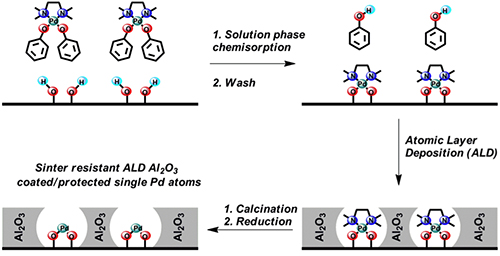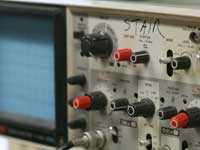Isolated metal heterogeneous catalysts stabilized by atomic layer deposition
While the systematic study of extremely small (metal nuclearity of 1-20 atoms) supported late metal sites for catalysis is interesting, it is significantly hampered by sintering at conditions relevant to catalysis (high temperature, pressure). Achieving the synthesis of such small late metal atom sites that are stable against sintering even at high temperatures would therefore be a significant step towards reaching this goal. This research proposes to combine both ALD (atomic layer deposition) and solution phase chemisorption of discrete molecular inorganic complexes and clusters to synthesize stable supported metal catalysts with absolute atomic level control over nuclearity and elemental composition. Specifically, discrete molecular inorganic metal complexes and clusters will first be chemisorbed onto an oxide to deposit catalytically active metal sites, then overcoated with Al2O3 by ALD to impart sinter resistance. Finally remaining organic moieties will be removed by calcination under O2 to yield the supported catalyst. To date, monatomic diamine-chelated Pd phenoxide complexes have been prepared and chemisorbed on SiO2. The reactions were monitored by solution phase NMR and the supported complexes were characterized by DRIFTS.
 Figure 1: A scheme for the synthesis of stable single metal atom sites.
Figure 1: A scheme for the synthesis of stable single metal atom sites.
Grant: ICEP

